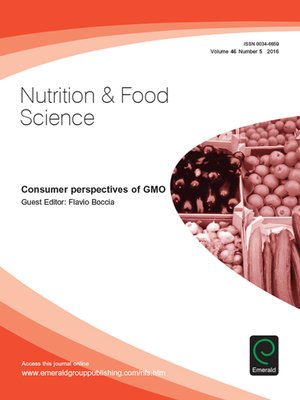Nutrition & Food Science, Volume 46, Issue 5
ebook ∣ Consumer perspectives of GMO · Nutrition & Food Science
By Flavio Boccia

Sign up to save your library
With an OverDrive account, you can save your favorite libraries for at-a-glance information about availability. Find out more about OverDrive accounts.
Find this title in Libby, the library reading app by OverDrive.



Search for a digital library with this title
Title found at these libraries:
| Library Name | Distance |
|---|---|
| Loading... |
The topic of consumer perspectives on food resulting from genetically modified organisms is extremely important and timely, but also characterized by confusion and contradictions. The dialogue is often hard due to different positions of stakeholders: both on consumer perspectives (above all from a health point of view) and on environmental consequences, effects of new biotechnological products, patents, national and worldwide regulations, businesses reactions, competitiveness.Transgenic foods could be considered as daily conventional foods, that carry various kinds of well-known genetic modifications, and sometimes they are also able to perform a particular function. They are products which outwardly are the same as conventional ones, but they have features that can also be quite different. These foods could help improve the well-being of our society, especially for the fringe of the population with chronic diseases related to allergy phenomena or food intolerance, or a deficiency/excess of certain nutritional factors. The presence of novel foods on the market could improve their diet and, consequently, their well-being.However, it is also needed to consider that transgenic foods are obviously different from conventional ones and, therefore, their consumption requires awareness, in order to prevent not desired uses, or uses which could be affected by misleading or deceptive communications. In addition, several surveys show that the novel foods are not accepted unconditionally by consumers.So in this ebook, it is very interesting to include such a large range of submissions both referring to their content and to fields of research variety. Moreover, each author offers a different way to approach this particular argument, through own work experience, studies and researches, investigations resulting from years of specialized and multidisciplinary scientific analysis. It includes several kinds of works, each attempting to clarify a particular aspect, both through quantitative and qualitative investigations from the methodological point of view: common errors relating to GMOs; positions in different macroeconomic areas, proposing comparisons; specific legal issues; consumer attitude towards novel foods and their acceptance; impact of modern biotechnology research; companies attitude towards GM crops.







